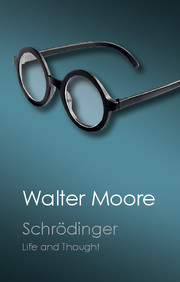Book contents
- Frontmatter
- Contents
- Preface
- Chronology
- Introduction
- 1 Family, childhood and youth
- 2 University of Vienna
- 3 Schrödinger at war
- 4 From Vienna to Zürich
- 5 Zürich
- 6 Discovery of wave mechanics
- 7 Berlin
- 8 Exile in Oxford
- 9 Graz
- 10 Wartime Dublin
- 11 Postwar Dublin
- 12 Home to Vienna
- References
- Name index
- Subject index
4 - From Vienna to Zürich
Published online by Cambridge University Press: 05 October 2015
- Frontmatter
- Contents
- Preface
- Chronology
- Introduction
- 1 Family, childhood and youth
- 2 University of Vienna
- 3 Schrödinger at war
- 4 From Vienna to Zürich
- 5 Zürich
- 6 Discovery of wave mechanics
- 7 Berlin
- 8 Exile in Oxford
- 9 Graz
- 10 Wartime Dublin
- 11 Postwar Dublin
- 12 Home to Vienna
- References
- Name index
- Subject index
Summary
In the midst of all the postwar turmoil and suffering, Erwin took no respite from his intensive research at the Physics Institute. He also filled notebook after notebook with commentaries based upon his reading of European and Eastern philosophers. It was in these dying days of the Danube Empire that he formed the foundations of his philosophy, which was to remain remarkably constant all his life. His interest in philosophy at this time was so intense that he even considered the possibility of devoting his intellectual life to that field. It would have been an inopportune decision, since philosophers now began to consider their subject as a self-contained discipline pursued by specialists for academic ends. Wittgenstein's Tractatus Logico- Philosophicus became the bible of the Vienna School of logical positivism. ‘What is history to me?’, he wrote, ‘Mine is the first and only world’. The task of trying to repair the wreckage of European civilisation may, however, have been hopeless even if help from the philosophers had been forthcoming.
Schopenhauer
Erwin read everything written by Schopenhauer. The luminous words of the philosopher of pessimism were perfectly suited to the world of 1919, and in that context may even have had a consoling effect, making some sense of Europe's four years of self destruction.
Arthur Schopenhauer (1788-1860) was born in Danzig, the son of Heinrich, a rich Hanseatic merchant, and Johanna, a romantic novelist. As a youth, he traveled widely, becoming fluent in English and French, so that his prose style acquired a lightness and clarity quite unlike the murky philosophic German of his times. His first education was that of a man of the world, only later did he obtain the usual academic credentials. He became a friend of Goethe, and in 1816 wrote a small book on color theory inspired by the ideas of the older man.
Schopenhauer regarded himself as the true spiritual descendant of Kant, and he did not hide his view that Hegel, then at the height of his fame, and other university philosophers were charlatans who had perverted the Kantian gospels.
- Type
- Chapter
- Information
- SchrödingerLife and Thought, pp. 111 - 144Publisher: Cambridge University PressPrint publication year: 2015

